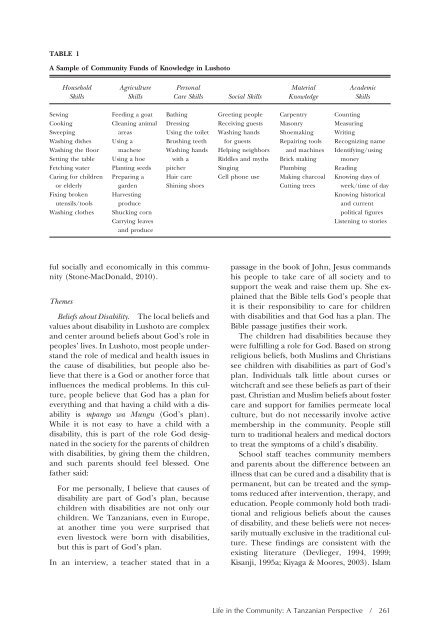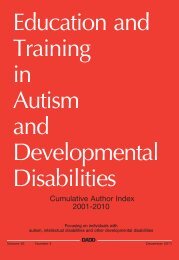etadd_47(3) - Division on Autism and Developmental Disabilities
etadd_47(3) - Division on Autism and Developmental Disabilities
etadd_47(3) - Division on Autism and Developmental Disabilities
You also want an ePaper? Increase the reach of your titles
YUMPU automatically turns print PDFs into web optimized ePapers that Google loves.
TABLE 1<br />
A Sample of Community Funds of Knowledge in Lushoto<br />
ful socially <strong>and</strong> ec<strong>on</strong>omically in this community<br />
(St<strong>on</strong>e-MacD<strong>on</strong>ald, 2010).<br />
Themes<br />
Household<br />
Skills<br />
Sewing<br />
Cooking<br />
Sweeping<br />
Washing dishes<br />
Washing the floor<br />
Setting the table<br />
Fetching water<br />
Caring for children<br />
or elderly<br />
Fixing broken<br />
utensils/tools<br />
Washing clothes<br />
Agriculture<br />
Skills<br />
Feeding a goat<br />
Cleaning animal<br />
areas<br />
Using a<br />
machete<br />
Using a hoe<br />
Planting seeds<br />
Preparing a<br />
garden<br />
Harvesting<br />
produce<br />
Shucking corn<br />
Carrying leaves<br />
<strong>and</strong> produce<br />
Beliefs about Disability. The local beliefs <strong>and</strong><br />
values about disability in Lushoto are complex<br />
<strong>and</strong> center around beliefs about God’s role in<br />
peoples’ lives. In Lushoto, most people underst<strong>and</strong><br />
the role of medical <strong>and</strong> health issues in<br />
the cause of disabilities, but people also believe<br />
that there is a God or another force that<br />
influences the medical problems. In this culture,<br />
people believe that God has a plan for<br />
everything <strong>and</strong> that having a child with a disability<br />
is mpango wa Mungu (God’s plan).<br />
While it is not easy to have a child with a<br />
disability, this is part of the role God designated<br />
in the society for the parents of children<br />
with disabilities, by giving them the children,<br />
<strong>and</strong> such parents should feel blessed. One<br />
father said:<br />
For me pers<strong>on</strong>ally, I believe that causes of<br />
disability are part of God’s plan, because<br />
children with disabilities are not <strong>on</strong>ly our<br />
children. We Tanzanians, even in Europe,<br />
at another time you were surprised that<br />
even livestock were born with disabilities,<br />
but this is part of God’s plan.<br />
In an interview, a teacher stated that in a<br />
Pers<strong>on</strong>al<br />
Care Skills Social Skills<br />
Bathing<br />
Dressing<br />
Using the toilet<br />
Brushing teeth<br />
Washing h<strong>and</strong>s<br />
with a<br />
pitcher<br />
Hair care<br />
Shining shoes<br />
Greeting people<br />
Receiving guests<br />
Washing h<strong>and</strong>s<br />
for guests<br />
Helping neighbors<br />
Riddles <strong>and</strong> myths<br />
Singing<br />
Cell ph<strong>on</strong>e use<br />
Material<br />
Knowledge<br />
Carpentry<br />
Mas<strong>on</strong>ry<br />
Shoemaking<br />
Repairing tools<br />
<strong>and</strong> machines<br />
Brick making<br />
Plumbing<br />
Making charcoal<br />
Cutting trees<br />
Academic<br />
Skills<br />
Counting<br />
Measuring<br />
Writing<br />
Recognizing name<br />
Identifying/using<br />
m<strong>on</strong>ey<br />
Reading<br />
Knowing days of<br />
week/time of day<br />
Knowing historical<br />
<strong>and</strong> current<br />
political figures<br />
Listening to stories<br />
passage in the book of John, Jesus comm<strong>and</strong>s<br />
his people to take care of all society <strong>and</strong> to<br />
support the weak <strong>and</strong> raise them up. She explained<br />
that the Bible tells God’s people that<br />
it is their resp<strong>on</strong>sibility to care for children<br />
with disabilities <strong>and</strong> that God has a plan. The<br />
Bible passage justifies their work.<br />
The children had disabilities because they<br />
were fulfilling a role for God. Based <strong>on</strong> str<strong>on</strong>g<br />
religious beliefs, both Muslims <strong>and</strong> Christians<br />
see children with disabilities as part of God’s<br />
plan. Individuals talk little about curses or<br />
witchcraft <strong>and</strong> see these beliefs as part of their<br />
past. Christian <strong>and</strong> Muslim beliefs about foster<br />
care <strong>and</strong> support for families permeate local<br />
culture, but do not necessarily involve active<br />
membership in the community. People still<br />
turn to traditi<strong>on</strong>al healers <strong>and</strong> medical doctors<br />
to treat the symptoms of a child’s disability.<br />
School staff teaches community members<br />
<strong>and</strong> parents about the difference between an<br />
illness that can be cured <strong>and</strong> a disability that is<br />
permanent, but can be treated <strong>and</strong> the symptoms<br />
reduced after interventi<strong>on</strong>, therapy, <strong>and</strong><br />
educati<strong>on</strong>. People comm<strong>on</strong>ly hold both traditi<strong>on</strong>al<br />
<strong>and</strong> religious beliefs about the causes<br />
of disability, <strong>and</strong> these beliefs were not necessarily<br />
mutually exclusive in the traditi<strong>on</strong>al culture.<br />
These findings are c<strong>on</strong>sistent with the<br />
existing literature (Devlieger, 1994, 1999;<br />
Kisanji, 1995a; Kiyaga & Moores, 2003). Islam<br />
Life in the Community: A Tanzanian Perspective / 261

















